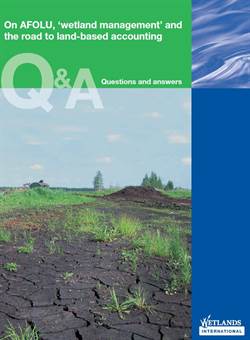
Q&A on AFOLU, ‘wetland management’ and the road to land-based accounting
-
Climate mitigation and adaptation
-
Peatland conservation and restoration
Better management of terrestrial carbon stores (reservoirs) and fluxes (emissions and removals) can make a substantial contribution to reducing atmospheric greenhouse gas concentrations. This Question & Answer booklet aims to give insight into the opportunities and obstacles with regard to reporting and accounting for changes in carbon stores in, and anthropogenic greenhouse gas fluxes from, terrestrial ecosystems. Special attention is paid to ‘wetland management’, a proposed new accounting activity under LULUCF for which huge emissions reduction potentials are readily available. This Question and Answer booklet on AFOLU (Agriculture, Forestry and Other Land Uses) has been developed for the UN-FCCC negotiations on land use, land-use change and forestry (LULUCF) and was produced by Wetlands International and the University of Greifswald.
It is concluded that the technical capacity, practical methodologies and user-friendly guidance for reporting and accounting for the most significant sources of emissions are already available or within reach before the start of the Kyoto Protocol’s second commitment period in 2013. Elements of a roadmap towards mandatory, comprehensive, land-based accounting in the third commitment period are presented. Adoption of such a roadmap would provide strong incentives to address and resolve any outstanding methodological or capacity-building problems during the second commitment period (as we see for REDD+).

